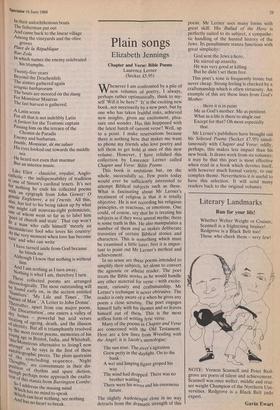Plain songs
Elizabeth Jennings
Chapter and Verse: Bible Poems
Laurence Lerner (Seeker £5.95)
whenever I am confronted by a pile of new volumes of poetry, I always, perhaps rather optimistically, think to my- self 'Will it be here?' It' is the exciting new book, not necessarily by a new poet, but by one who has taken fruitful risks, achieved new insights, given me excitement, plea- sure and wonder. Has this happened with the latest batch of current verse? Well, up to a point. I make reservations because there is nothing here that makes me want to phone my friends who love poetry and tell them to get hold at once of this new volume. However, I have relished this collection by Laurence Lerner called
Chapter and Verse: Bible Poems.
This book is ambitious but, on the whole, successfully so. Few poets today would ever be sufficiently interested to attempt Biblical subjects such as these. What is fascinating about Mr Lerner's treatment of religion is that it is totally objective. He is not recording his religious principles, or reactions, or emotions. One could, of course, say that he is treating his subjects as if they were unreal myths; there is some truth in this. He also manipulates a number of them and so makes deliberate travesties of certain Biblical stories and characters. This is something which must be examined a little later; first it is impor- tant to point out Mr Lerner's method and achievement.
In no sense are these poems intended to simplify their subjects, let alone to convert the agnostic or atheist reader. The poet treats the Bible stories as he would handle any other material for verse — with excite- ment, curiosity and craftsmanship. Mr Lerner's technique is never obtrusive. The reader is only aware of it when he gives any poem a close scrutiny. The poet engages himself fully with his themes and so leaves himself out of them. This is the most selfless form of writing lyric verse. Many of the poems in Chapter and Verse are concerned with the Old Testament. Here are a few lines from Wrestling with the Angel; it is Jacob's monologue:
The sun rose. The river's agitation Grew petty in the daylight. On to the bank A wet and limping figure groped his way.
The wind had dropped. There was no
brother waiting .
There were his wives and his enormous future.
The slightly Audenesque close in no way matic strength of this detracts from the dra
poem. Mr Lerner uses many forms with great skill. His Ballad of the Hero is perfectly suited to its subject, a sympathe- tic handling of the hunted history of the Jews. Its penultimate stanza functions with great simplicity: God sent the Jews a hero, He stirred up anarchy. He was very good at killing But he didn't set them free.
This poet's tone is frequently ironic but never cheap. Strong feeling is checked by a craftsmanship which is often virtuosity. An example of this are these lines from God's Mother: . . . there it is in paint Me as God's mother. Me as penitent. What in a life is there to single out Except for that? Oh most especially that.
Mr Lerner's publishers have brought out his Selected Poems (Secker £7.95) simul- taneously with Chapter and Verse; oddly, perhaps, this makes less impact than his new book. It draws work from six volumes; it may be that this poet is most effective when read in a book which devotes itself, with however much formal variety, to one complex theme. Nevertheless it is useful to have this selection. It will send many readers back to the original volumes.












































 Previous page
Previous page